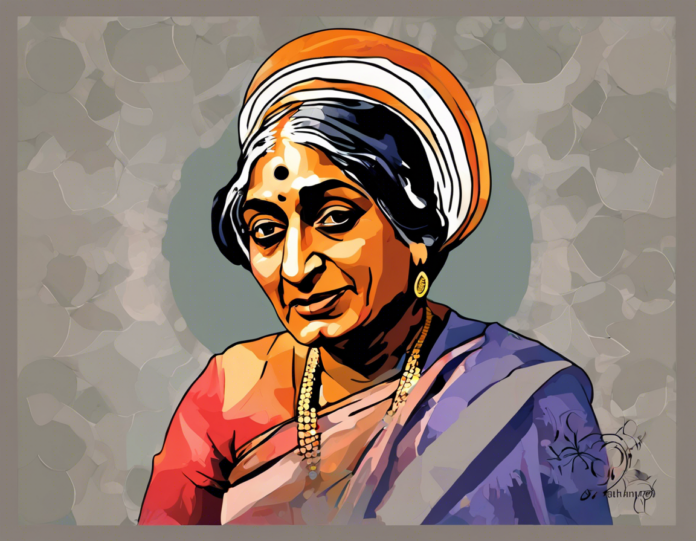Sarojini Naidu, popularly known as the Nightingale of India, was a prominent figure in India’s struggle for independence and a poet of exceptional talent. Her legacy is deeply rooted in her contributions to the literary world, her fearless advocacy for women’s rights, and her dedicated efforts towards achieving Indian independence. Let’s delve into the life and legacy of this extraordinary woman and explore the impact she left on Indian society and culture.
Early Life and Education
Sarojini Naidu was born on February 13, 1879, in Hyderabad, India. She was fortunate to be born into a family that valued education, which was not very common for girls in that era. Her father, Aghorenath Chattopadhyay, was a scientist, philosopher, and educator, who played a significant role in shaping her intellectual curiosity and passion for learning.
Naidu excelled academically and went on to study at King’s College, London, and Girton College, Cambridge, becoming the first Indian woman to study at a British university. Her education not only shaped her worldview but also empowered her to become a trailblazer for women’s education in India.
Poetry and Literary Contributions
Sarojini Naidu’s literary talents were evident from a young age, and she began writing poetry that captured the essence of Indian culture, traditions, and the beauty of its landscapes. Her writing reflected her deep love for her country and its people, earning her the title of “Nightingale of India” for her lyrical and melodious poetry.
One of her most famous works, “Golden Threshold,” published in 1905, showcased her poetic prowess and established her as a leading literary figure of her time. Her poems resonated with themes of freedom, equality, and the awakening of a nation, inspiring generations of Indians to strive for independence.
Political Activism and Women’s Rights
In addition to her literary pursuits, Sarojini Naidu was actively involved in India’s struggle for independence. She worked closely with Mahatma Gandhi and other leaders of the freedom movement, using her oratory skills to mobilize support for the cause. Naidu’s eloquence and charisma made her a powerful spokesperson for the Indian National Congress, where she advocated for the rights of women and marginalized communities.
Naidu was a staunch supporter of women’s suffrage and played a key role in advancing gender equality in India. She believed that women had a crucial role to play in the country’s progress and actively campaigned for their rights to education, employment, and political participation. Her efforts paved the way for future generations of Indian women to pursue their aspirations and contribute to nation-building.
Legacy and Impact
Sarojini Naidu’s legacy transcends boundaries of time and space, continuing to inspire people around the world. Her poetry remains a timeless reflection of India’s rich cultural heritage and the struggles of its people. Naidu’s advocacy for women’s rights laid the foundation for the feminist movement in India, empowering women to challenge societal norms and demand equality.
As a political leader, Naidu’s fearless determination and unwavering commitment to freedom set a precedent for future generations of activists and revolutionaries. Her legacy reminds us of the power of words, the importance of equality, and the enduring spirit of resistance in the face of oppression.
Frequently Asked Questions (FAQs)
1. What were Sarojini Naidu’s major contributions to Indian literature?
Sarojini Naidu was a prolific poet whose works celebrated India’s culture, heritage, and struggle for independence. Her poetry collection “Golden Threshold” is among her most acclaimed works.
2. How did Sarojini Naidu contribute to the Indian independence movement?
Naidu actively participated in the freedom struggle, working alongside leaders like Mahatma Gandhi to mobilize support for independence. Her oratory skills and advocacy for women’s rights made her a prominent figure in the movement.
3. What role did Sarojini Naidu play in promoting women’s rights in India?
Naidu was a vocal advocate for women’s suffrage, education, and empowerment. She believed in the equal rights of women and worked tirelessly to advance gender equality in Indian society.
4. Why is Sarojini Naidu referred to as the “Nightingale of India”?
Sarojini Naidu’s lyrical and melodious poetry earned her the title of the “Nightingale of India,” symbolizing her ability to capture the essence of the nation’s beauty and resilience through her words.
5. What is Sarojini Naidu’s enduring legacy?
Sarojini Naidu’s legacy lies in her literary contributions, her advocacy for women’s rights, and her role in India’s independence movement. She continues to inspire generations of Indians and serves as a symbol of courage and resilience.









